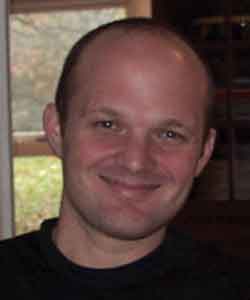Andy Baron
 University of British Columbia
University of British Columbia
http://childdevelopment.psych.ubc.ca
What does your research focus on?
My research focuses on the development of intergroup cognition from infancy through adolescence. In particular, I examine the development of intergroup attitudes and stereotypes across implicit and explicit levels of analysis. My work also examines how children’s conceptual representations of group membership (as an ingroup or an outgroup member) develop across these years and how such representations constrain a variety of psychological processes including categorization, induction, evaluation, memory, and perception. My work also aims to characterize which aspects of intergroup cognition are experience-independent and how such knowledge is shaped by enculturation.
What drew you to this line of research and why is it exciting to you?
Since my early years as an undergraduate at the University of Michigan working with Drs. Oscar Ybarra and Eugene Burnstein, I have been fascinated with understanding the psychology of social-cognition. Humans spend most of their time interacting with conspecifics, directly and indirectly, and much of our mental life is spent thinking about these interactions (past, present, and future). Despite the significance of social-cognition in everyday life, the cognitive and cultural origins of such processes leave many questions unanswered. Indeed, children provide a unique window into understanding the cognitive foundations of intergroup cognition (e.g., the extent to which prejudice and discrimination is an automatic feature of how the mind processes information). I believe that the study of social cognitive development will pave the way for producing real change in adult behavior, especially in the domain of intergroup cognition where attitudes and stereotypes are known to have a profound influence.
Who were/are your mentors or scientific influences?
I really credit Mahzarin Banaji and Susan Carey for their independent roles in shaping my intellectual appreciation for and understanding of intergroup cognition and conceptual development. I was incredibly lucky to have both of them serve as mentors during my graduate studies at Harvard and their support has been invaluable to my growth as an intellectual, a scientist, a teacher, and a person. In addition, Mahzarin was particularly influential as a model for her commitment to social justice education and the translation of science through community outreach. Inspired by her decades of engagement and service, at the University of British Columbia I established a community-based research laboratory at Science World, a public science center where visitors have an opportunity to observe cutting-edge science in action and can engage directly with researchers studying cognitive development to learn more about the scientific method (see www.scienceworld.ca/lab).
What’s your future research agenda?
I have several goals. First, I will continue to unpack the mechanisms involved in the development of intergroup cognition with a particular focus on identifying the building blocks of social categorization in infancy and early toddlerhood. Similarly, I plan to identify the cognitive mechanisms underlying the acquisition of intergroup attitudes and stereotypes in early childhood, and how such representations interface with infants’ burgeoning understanding of the social world. Second, I plan to characterize the development of the implicit associative system. Whereas my current work has charted the development of implicit attitudes, current and future work will examine what domain-general and domain-specific processes underlie the acquisition and development of implicit associations (attitudes and stereotypes) with a particular emphasis on identifying the developmental trajectory of such associations. Third, I plan to continue my work examining the development of children’s conceptual representations of group membership. Fourth, I plan to continue building a platform for the public dissemination of scientific knowledge through my research partnerships with area science centers and children’s museums that will hopefully serve as an international model for increasing science literacy among children and their adult caretakers.
What publication are you most proud of?
Baron, A. S., & Banaji, M. R. (2006). The development of implicit attitudes: Evidence of race evaluations from ages six, 10 and adulthood. Psychological Science, 17, 53–58.
I am probably most proud of my very first publication for several reasons. First, it was my first publication and that always will hold a special place. Second, it was among the first in the field to demonstrate that a) implicit attitudes could be measured, b) that children have acquired them surprisingly early in development, and c) that the magnitude of these implicit attitudes appears to undergo very little change across development, a rather surprising and counterintuitive finding given most theories of implicit social cognition at the time. This paper also introduced the Child IAT, a now well-used procedure for measuring implicit associations in children ages five and older. Much of my work (and publications since) has built upon these early findings to produce a more comprehensive model of the development of implicit social cognition. Thus, this publication was foundational for my own research program as well.





APS regularly opens certain online articles for discussion on our website. Effective February 2021, you must be a logged-in APS member to post comments. By posting a comment, you agree to our Community Guidelines and the display of your profile information, including your name and affiliation. Any opinions, findings, conclusions, or recommendations present in article comments are those of the writers and do not necessarily reflect the views of APS or the article’s author. For more information, please see our Community Guidelines.
Please login with your APS account to comment.